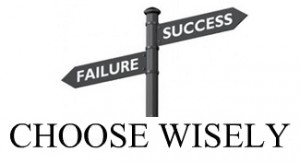In a June 25, 2012 release of the Association For Psychological Science, Krishna Savani of Columbia Business School and Aneeta Rattan of Stanford University share their research into the role of ‘choice’ in American attitudes about wealth inequality. The release, “Thinking About Choice Diminishes Concern for Wealth Inequality“, describes their study and how it revealed that people’s attitudes about wealth inequality generally reflect their attitudes about ‘choice’. From the release:

If we assume that people make free choices, they theorized, while at the same time we acknowledge that some people are rich and others are poor, we may be more likely to believe that inequality in life outcomes is justified and reasonable because it must be the result of individual choice.
When people think in terms of choice, they become focused on the idea that people gain wealth through their own choices and not because of social protections. This additional emphasis on individual agency leads them to be less disturbed about the wealth inequalities that exist.
In one of their experiments the researchers found that people who think in terms of choice under-emphasize the role of societal structures in allowing individuals to create and accumulate wealth.
It’s an interesting study that prompts the age old questions about ‘choice’, ‘free will’, and ‘responsibility’ – questions with implications that go far beyond our attitudes about wealth inequality.
The attribution of choice lies at the heart of virtually all forms of social inequality and what might also be called “self-inequality”. How we hold ourselves responsible for our choices forms much of the basis for how proud or ashamed of ourselves we are. How we hold others responsible for their choices forms much of the basis for our judgements about them. After all, if we believe that ‘success’ is the product of individual choice then so to is ‘failure’.
As a way of exploring the role of choice in our lives, try this thought experiment: think of a friend of yours who is far less advantaged in life. Imagine you were born into his or her body and lived their life since birth. Would you be any different than they are now? How do you know? On what basis could you possibly assume that you would be different? This is a bit of a trick because it presupposes there is a you (some kind of essence or soul) that exists independently of who you’ve learned to be. I’m not saying there isn’t such a soul, rather that anything we can say about it is through the prism of our learning. Hopefully you get the point. The differences between your choices and your less fortunate friend’s are not necessarily choices you chose to have.
‘Choice’ implies choices. If there are no choices to choose from, do we really have any choice? If our choices are limited to choices others chose for us are we still as responsible for them?
Third graders struggling with reading don’t choose to become ashamed of their minds. As children shame out of learning to read, they don’t understand they are making a ‘choice’ that will disable an uncountable number of future life options and therefore future life choices. Do the choices of a literate person and a markedly less literate person differ? Sure they do. Did they choose to have those differences? Do children choose to be inadequately prepared, confused, or feel ashamed of their reading (or math or…)? No they don’t. Children don’t choose to grow up in families that are low literate, taciturn, or emotionally unhealthy. They don’t realize that any one of those factors can cause them to struggle with the challenges of learning to read. Is the child responsible for their parents’ ignorance or their schools’ inability to teach them (in a way that provides what they need given their level of readiness)? Of course not. Yet, we all (unintentionally, yet pervasively) conspire to cause them to think that they are.
By framing ‘failure’ as a choice – as the result of purely personal decision or effort – we create the conditions in which millions of children blame themselves for difficulties that are in no way their fault. Self-blame about learning difficulties = mind-shame. Children don’t choose to avoid situations that cause them shame, their innate, unconscious, emotional intelligence does.
What aspect of ‘choice’ isn’t learned? If it’s the differences in our learning environments that most affect our learning differences and our differences in learning that most affects our ‘choices’ in life, on what basis can we judge others for their choices?
I am not saying we aren’t responsible for our choices. I am saying that it’s no where near that simple. Our choices are enabled and constrained by our learning. Yes, our learning is also enabled and constrained by our choices, but it’s also enabled and constrained by forces and factors over and about which we have no choice. Babies have no choice about how much their parents talk to them yet the volume and quality of the language they are bathed in (before they’re even 3 years old) has a profoundly powerful affect on how well they will do in school, which in turn, affects their path in life, their options in life, and their capacity for choice within those options. (see 6-30-2012 post: “Higher Vocabulary ~ Higher Intelligence ~ Higher Income)
Ultimately wealth inequality, like so many inequalities, boils down to learning opportunity inequality.
But for the difference in our learning opportunities there go I.

Thank you for your wisdom